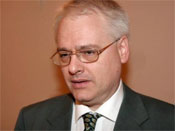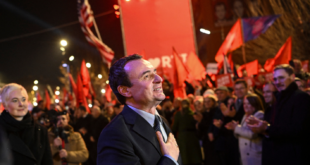 Ivo Josipovic, Croatia’s newly elected president, in an interview for Bosnian media this weekend, said it is too early to talk about withdrawing the law suit at the International Court of Justice, ICJ, against Serbia for genocide, filed in 1999.
Ivo Josipovic, Croatia’s newly elected president, in an interview for Bosnian media this weekend, said it is too early to talk about withdrawing the law suit at the International Court of Justice, ICJ, against Serbia for genocide, filed in 1999.
“With that suit certain goals should have been achieved. When it was filed, Serbia did not cooperate with us on the questions of prisoners or missing people, Serbia did not work on war crimes prosecution and did not cooperate with the ICTY (International Criminal Tribunal for the Former Yugoslavia). Besides, Serbia was reluctant to cooperate with us on the return of valuable cultural items,” said Josipovic, noting that a large number of artefacts were taken from Croatia to Serbia.
However, the new president added that he believes that cooperation has improved over the years.
“If we have cooperation in all of these crucial fields, than we will not need a case against Serbia. But, without it, for the Croatian public withdrawal is not possibility,” he said in an interview to the Slobodna Bosna weekly in Sarajevo.
Croatia’s genocide’s suit is in connection with crimes committed by the Yugoslav peoples’ army and Serbian paramilitary allies in the early 1990s, after Croatia declared independence.
At the beginning of this year, Serbia filed a countersuite against Croatia to the same court.
Josipovic, a lawyer by education and profession, was asked to comment on the impact of the ICTY in the region and its importance. He said he believes that the Tribunal has played a very important role in establishing international norms of justice, but some mistakes were made.
“One of the huge mistakes is that they did not have good communication with states that had been involved in the war and, in some way, they allowed, together with the international community, a negative perception to be created about its work,” Josipovic said.
Josipovic pointed out that part of the public in Croatia sees the Tribunal as a court set up only to try Croats “even though only three persons from our country have been in the front of the Tribunal”.
“In Serbia they believe that it is only for Serbs and that its existence is part of the international conspiracy. In Bosnia, the Tribunal is guilty for equalizing crimes. For these kind of perceptions, part of the blame lies with locals, but also with the fact that a global message was not delivered well to those countries,” said Josipovic.
At the same time, he is aware of the positive role the ICTY has had not only in the region, but internationally.
“The Tribunal opened a very important question of punishing war crimes at a time when nobody in the region had even thought about it. The Tribunal achieved lots of things, and just one is a moral message sent all over the world that it is not possible to do whatever one wants to do,” he said, adding that the ICTY’s existence opened the possibility for creating some permanent courts for war crimes.
“But the problem is that the Tribunal is limited in its powers. We could pose a question about the selection of the cases. I am not sure the right thing was always done and that all the people who were indicted are those who could have been seen as perpetuators of the biggest crimes, and that some of them could not have been prosecuted in the front of the national courts, instead. At the same time, I think that some of the cases were not prepared well enough,” Josipovic elaborated.
He said he thought the ICTY has had a positive influence on the local judiciary in the region.
“In Bosnia it is maybe less visible because of the presence of international judges. But in Croatia and Serbia, local prosecutors and judges are those who are running the cases and it is very good. Today in Croatia war crimes are prosecuted on a very high level,” he said.
Josipovic will be inaugurated on 17 February.
 Eurasia Press & News
Eurasia Press & News



